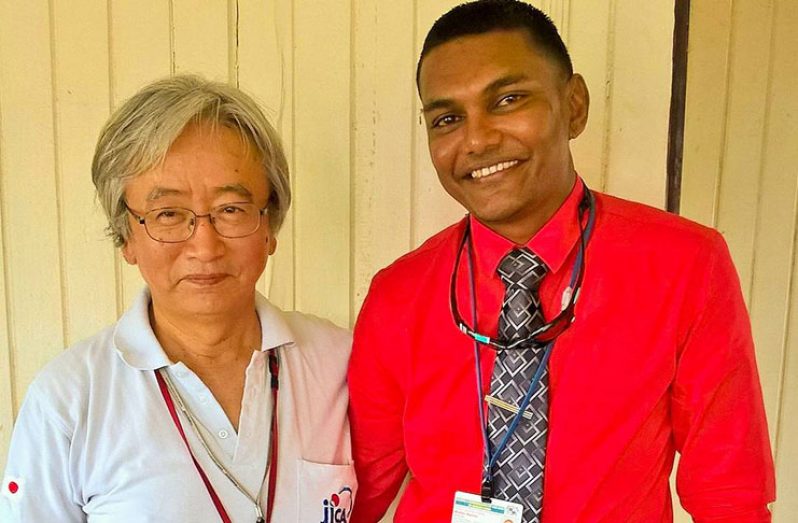VISITING Japanese Waste Treatment Specialist Takamasa Eda, is here to spend six months with the Mayor and City Council’s (M&CC) Solid Waste Management Department to help with

certain age-old technologies the municipality wants to revive.
Eda, also a senior volunteer from the Japan International Cooperation Agency (JICA), is in Guyana for the first time, having also worked with similar initiatives in Guatemala.
In an interview with the Guyana Chronicle at the Solid Waste Department on Princes Street on Tuesday, Eda said he believes that department head Walter Narine has very good knowledge and technical experience, but needs support from citizens themselves, the city council, and the government.
One of the major projects that Eda will be helping with is the use of the composter and the bio-gas digester, which could result in saving costs for cooking gas and electricity.
“We are trying to get the municipal compost project going, and in Japan, they are not only doing composting, but they have innovative ways to use the waste to make new products.
“So, he will aid us with our plans in this area,” said Narine, who also sat in on the interview.
TEACH COMPOSTING
He wants to be able to teach schools how to do composting, and to give each of the 28 primary schools in Georgetown a composting bin. “Eda will help me develop a proposal to seek funding from agencies like JICA, IDB (Inter-American Development Bank) or other loan partners for the composting bins,” Narine said.
“He’s also helping me to prepare a flier that we will distribute to each school to teach them how to use, reuse and recycle the waste,” he added.

He said that since Guyana has a serious issue with the disposal of plastic bottles, Eda will assist him in writing a proposal to acquire funding to set up a recycling plant for plastic bottles.
On Thursday and Friday, City Hall will be hosting an exhibition where the completed composter and bio-digester will be on display. “We are also taking the plastic bags that everyone throws away, and we will show you how to make floor mats with them,” he said, adding:
“People might think these will tear, but when you see them, you will note that they won’t.”
He also said that at the exhibition, persons will be informed as to how to make toilet paper from their paper wastes. “This will be far cheaper than what you buy in the stores; all the facets of waste we have in Guyana, we want to find ways to reuse them in some way,” he pointed out.
Narine is hoping that by the time Eda is ready to leave in October, he will be in possession of at least four solid proposals that can be taken to lending agencies.
BIG PLANS
In a previous interview, Narine had told the Guyana Chronicle that he has big plans to use the bio-digester to power the entire solid waste compound, thus reducing its dependence on Guyana Power and Light (GPL).
“What we’re attempting to do is to set up one small-scale composter in every school, which will aid in our school programme this year.
“We want to provide them with bins; teach them how to do composting, and also give them the composter,” he had said, adding:
“So, all they need to do is throw their waste into the composter, give it a gentle turn, and within another six weeks, you have compost.
“If they do that every day, then they have the compost generating, and there is no cost to the school; we know how cash-strapped the schools are.
“We are also setting up a bio-digester, which basically breaks down the food waste or your cow or horse manure and produces methane gas.”
Methane gas can be used for cooking and power generation.
“What I want to do is to convert the methane gas into electricity and power this compound with the current and take us off the grid. We have direct access to the organic waste, which is from the municipal markets.
“A lot of people could do it, but they don’t have access to the waste; for them to do it, they will have to incur transportation costs which we don’t have to. That’s where we have an advantage,” Narine said.
He continued: “We in the municipality don’t really need the gas to cook, but households can do that to allow them to be less dependent on cooking gas.
“Your septic tank produces methane gas daily, and it is being wasted; you make the connections, and you don’t have to buy cooking gas at all.”
Narine said he will be looking to set up a team from his department that can install the bio-digester for anyone who is interested.
“They can call us; we can go and teach them the technology and set it up for them. They will have to pay for the materials, of course. You make this small investment, and you don’t have to buy cooking gas anymore,” he said.



.jpg)








